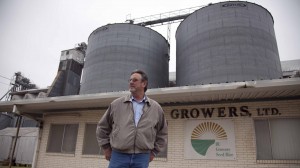TCEQ Goes Against Recommended Ruling, But Still Cuts Off Rice Farmers

Photo by Jeff Heimsath/StateImpact Texas
Joe Crane in front of his rice drying and storgage plant in Bay City, Texas.
For the third year in a row, most Texas rice farmers along the Lower Colorado River will not have water for their crops due to the ongoing drought.
Today, the Texas Commission on Environmental Quality (TCEQ) approved the Lower Colorado River Authority’s request for an emergency cutoff, but went against a recommended ruling by administrative law judges that suggested a trigger point for those cutoffs, instead removing a trigger level entirely.
After a 17-hour hearing last week, State Administrative Law Judges William Newchurch and Travis Vickery came to the conclusion that the LCRA-requested trigger level of 1.1 million acre-feet was actually insufficient, and recommended modifying the order to an even higher leve, to 1.4 million acre-feet. Right now the Highland Lakes have 761,700 acre-feet of water.
“The likelihood of reaching either of those trigger levels is almost negligible at this point, and so that certainly diminishes the importance of having a trigger level,” TCEQ chairman Bryan Shaw said. “The issue of properly managing water in the Lower Colorado River and these releases is much more complex than simply pulling a trigger number out of the air.”
“What purpose does it serve for us to set a trigger point today that we know has no impact during … this emergency order we’re considering?” Shaw said.
Parties in support of cutting off water releases downriver were surprised and disappointed by the decision, including one of the biggest players at the table, the City of Austin.
“We believe interruptible water should be interrupted this year, of course, but we think a trigger was an important part of this,” Greg Meszaros, director of Austin Water Utility, says. “It would provide some framework and guidance for future decisions. We’ll be back right at this in about a month or two, and without a trigger, it’s all up in the air again. I just hope we don’t keep repeating this like Groundhog Day.”
“As time-consuming and challenging and perhaps unpleasant as it is for many folks, I still think we would be better served to not have an automatic renewal. These issues are too critical,” Shaw said at the meeting. “While I see it very unlikely that we might reach conditions at the end of the initial period that would warrant not renewing that, this issue is important enough that my gut is to tell us that we probably should take that up and consider the conditions at that time.”
The TCEQ could take up the issue again this summer if the LCRA requests, with the possibility of ordering a release of water downstream if the lakes have recovered, or continuing the cutoff if they have not. The cutoff is good for 120 days, starting from January 26th.

